The Colorado Fair Debt Collection Practices Act ensures that debt collectors treat consumers fairly. It outlines your rights and prohibits abusive practices. This article will explain what the law covers, your protections, and steps to take if a debt collector violates your rights.
Key Takeaways
- The Colorado Fair Debt Collection Practices Act (FDCPA) protects consumers from abusive and deceptive debt collection practices, especially addressing specific local concerns.
- Key provisions of the Colorado FDCPA include communication regulations, prohibitions against harassment, and restrictions on false representations, ensuring ethical conduct from debt collectors.
- Consumers have rights under the Colorado FDCPA, such as the ability to dispute debts, request cessation of communication, and receive clear debt information, which empowers them against abusive practices.
Introduction to Debt Collection in Colorado
Debt collection in Colorado is governed by a combination of federal and state laws designed to protect consumers and ensure ethical practices within the debt collection business. The Fair Debt Collection Practices Act (FDCPA) and the Colorado Fair Debt Collection Practices Act (CFDCPA) set clear standards for how debt collectors and collection agencies must operate when collecting debts from individuals.
In Colorado, debt collectors are required to follow strict guidelines that promote fair debt collection. These rules cover how and when collectors can contact consumers, the information they must provide, and the steps they must take if a debt is disputed. Collection agencies must also be transparent in their dealings and are held accountable for any violations of consumer rights.
Additionally, both federal and state laws regulate how debt collectors report person credit information to consumer reporting agencies, ensuring that consumers are treated fairly and that their credit histories are accurately maintained. By understanding these protections, Colorado residents can better navigate interactions with debt collectors and safeguard their financial well-being.
Whether you are dealing with a collection agency or an individual debt collector, knowing your rights under Colorado law is the first step toward resolving outstanding debts and preventing abusive or unfair practices.
Overview of the Colorado Fair Debt Collection Practices Act
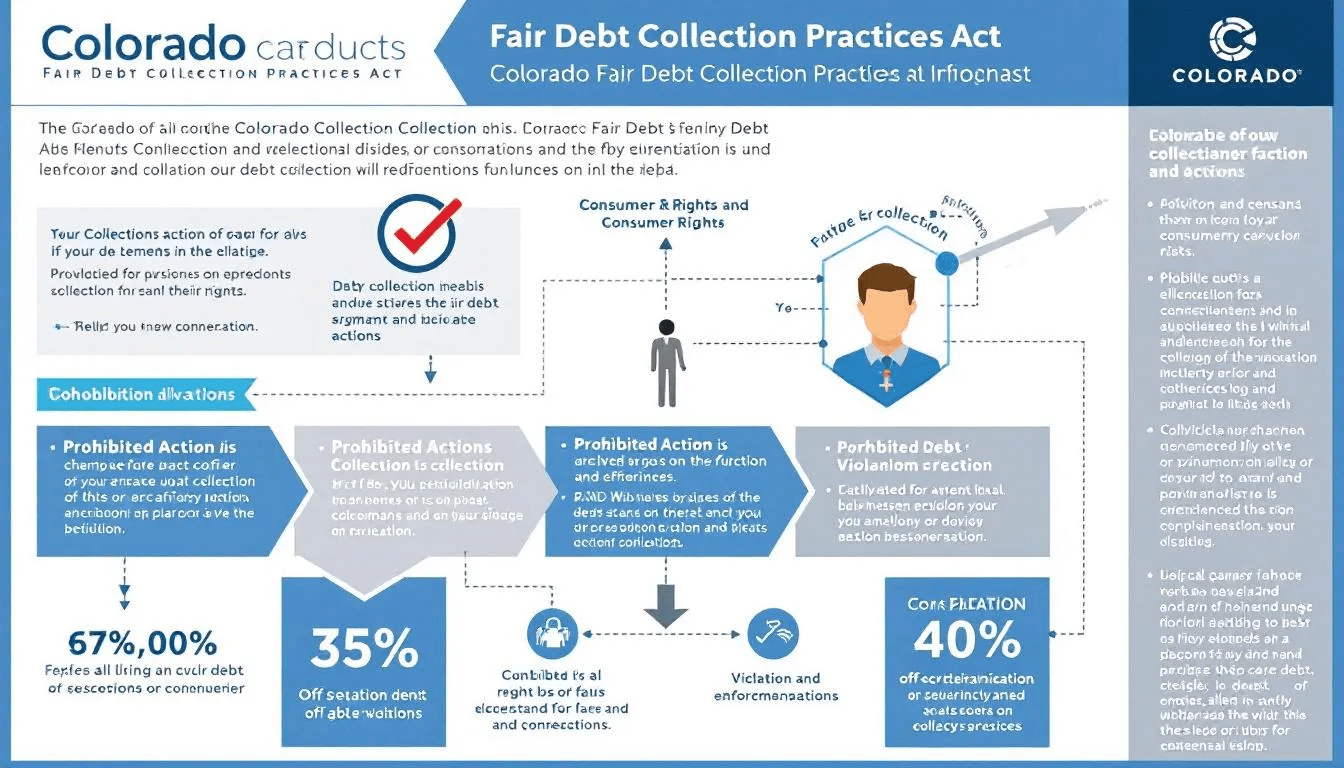

The Colorado Fair Debt Collection Practices Act (FDCPA) is a critical piece of legislation designed to protect consumers from abusive and overreaching debt collection tactics. It is tailored specifically to address the challenges faced by Colorado residents, ensuring that debt collectors operate within a framework that respects consumer rights and promotes fairness.
At its core, the Colorado FDCPA aims to shield consumers from deceptive, unfair, and abusive practices employed by debt collectors. This includes tactics such as harassment, false representations, and other methods that can cause undue stress and financial hardship for individuals. The legislation is a state-level counterpart to the federal FDCPA, providing additional protections and addressing specific local concerns.
One of the key distinctions of the Colorado FDCPA is its focus on the unique aspects of debt collection within the state. This includes provisions that go beyond federal regulations, such as specific rules for the collection of medical debt and other nuanced areas. These distinctions help consumers navigate their rights and the obligations of debt collectors in Colorado more effectively.
The act also emphasizes transparency and accountability within the debt collection business. It mandates that debt collectors provide clear and accurate information about the subject debt they are attempting to collect debts and prohibits any form of misrepresentation or deceit. The act specifically requires debt collectors to provide clear information about the consumer’s obligation and the debts owed, ensuring consumers understand the nature and extent of their financial responsibilities. This keeps consumers fully informed about their consumer’s obligation and enables them to take appropriate actions to address their multiple debts and pay debts while collecting debts.
Overall, the Colorado FDCPA balances the interests of consumers and debt collectors, ensuring that debt collection is conducted fairly and respectfully, and covers a wide range of debts owed by consumers, thus protecting individuals facing financial challenges.
Key Provisions of the Colorado FDCPA
The Colorado FDCPA is built on several key provisions designed to prevent abusive and deceptive practices in the debt collection business, as outlined in the Colorado revised statutes. These provisions outline the debt collector’s responsibilities and restrictions under the Colorado FDCPA. They include regulations on communication, prohibitions against harassment and abuse, and restrictions on false or misleading representations.
Each of these areas is crucial in ensuring that debt collectors operate within ethical and legal boundaries, protecting consumers from undue harm.
Communication Regulations
Communication is a significant aspect of debt collection, and the Colorado FDCPA sets clear guidelines on how debt collectors can interact with consumers. One primary regulation restricts contact times, prohibiting debt collectors from contacting consumers before 8 a.m. or after 9 p.m. without explicit consent, ensuring consumers are not disturbed during inconvenient times.
Consumers also have the right to request that debt collectors cease direct communication altogether, reflecting consumer wishes. When the consumer notifies collectors in writing, they must comply with the consumer’s written request, and if the consumer refuses, this provides a powerful tool for those who feel overwhelmed or harassed by persistent calls and messages.
The act also bans the use of profane language and threats of violence, ensuring debt collectors maintain professionalism and respect, which is essential in preventing intimidation and emotional distress.
Within five days of initial communication, debt collectors must provide a written notice detailing the debt, including the amount owed, the creditor’s name, and a statement that the consumer has 30 days to dispute the debt. During the initial oral communication, debt collectors must clearly identify themselves and disclose that they are attempting to collect a debt. This ensures transparency and allows consumers to verify the debt’s legitimacy.
The communication regulations under the Colorado FDCPA aim to create a respectful and transparent process, protecting consumers from undue stress and ensuring debt collectors adhere to ethical standards.
Harassment and Abuse Prohibitions
Harassment and abuse are serious concerns in debt collection, and the Colorado FDCPA explicitly forbids such behavior, including repeatedly calling consumers to annoy, abuse, or harass them, and using aggressive language. Additionally, the act prohibits engaging in a telephone conversation repeatedly or continuously with the intent to annoy, abuse, or harass the recipient.
The act also prohibits any form of physical threats or intimidation. Debt collectors cannot threaten violence or harm to the consumer or their property. Such actions are considered abusive and are strictly forbidden to ensure the safety and well-being of consumers.
The Colorado FDCPA also bans the use of obscene or profane language, requiring debt collectors to maintain professionalism and civility. These prohibitions are crucial in creating a respectful and non-threatening environment for consumers.
False or Misleading Representations
The Colorado FDCPA takes a firm stance against false, deceptive, or misleading representations in debt collection. Debt collectors are prohibited from making any false claims about the amount, legal status, or character of the debt. This ensures that consumers are not misled about their financial obligations. Misleading representation also includes presenting documents as legal process forms when they are not, which is strictly prohibited.
For example, a debt collector falsely claiming a consumer owes more than they do or threatening legal action they have no intention of taking is both unethical and illegal under the Colorado FDCPA, especially when done through unfair or unconscionable means. Additionally, falsely claiming that a document is a legal process form is a violation of the law.
Who Is Covered Under the Colorado FDCPA?
The Colorado FDCPA applies specifically to collection agencies, solicitors, and other debt collectors engaged in collecting consumer debts within the state. This includes any business or individual whose principal business is debt collection, where the debt arises from a transaction in which a natural person obligated or allegedly obligated to pay is involved. However, there are certain exemptions. Creditors collecting their own debts, employees of the United States government, and employees of any political subdivision are not subject to the Colorado FDCPA.
It’s important to note that the Colorado FDCPA covers only consumer debts. This means debts incurred for personal, family, or household purposes by a natural person obligated or allegedly obligated to pay. Debts related to business, investment, or agricultural purposes are excluded from the act’s protections. Understanding who is covered under the act helps consumers identify whether their situation falls within its scope.
This distinction ensures that the protections and regulations are specifically tailored to the unique challenges faced by individual consumers, providing them with the necessary safeguards against abusive practices.
Licensing Requirements for Debt Collectors in Colorado
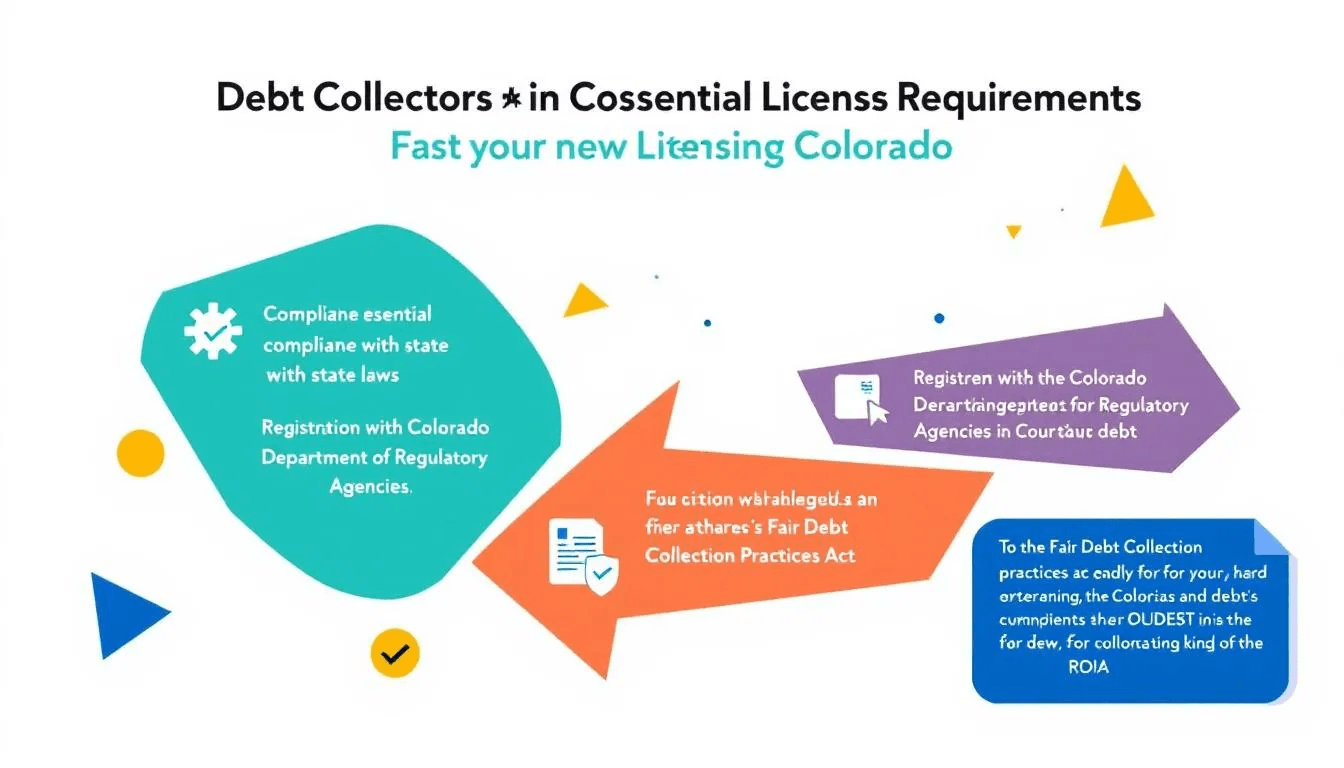

Debt collectors must obtain a valid license to operate legally in Colorado, ensuring only qualified and vetted individuals engage in debt collection. Applicants must provide detailed financial information, including their business history and any past legal issues. The state may also review the corporate control and ownership structure of the collection agency to ensure compliance with regulations.
A nonrefundable investigation fee is required when submitting a license application, covering the cost of reviewing the applicant’s background. Additionally, collection agencies must employ a collections manager with at least two years of experience to ensure knowledgeable and experienced supervision.
Another requirement is the filing of a bond as specified in Colorado’s debt collection regulations. This bond acts as a financial guarantee that the agency will operate legally, covering damages if regulations are violated.
While branch offices of a collection agency do not need separate licenses, they must notify the state of their locations. This ensures that all operational sites are known and can be monitored for compliance with state regulations.
Consumer Rights Under the Colorado FDCPA
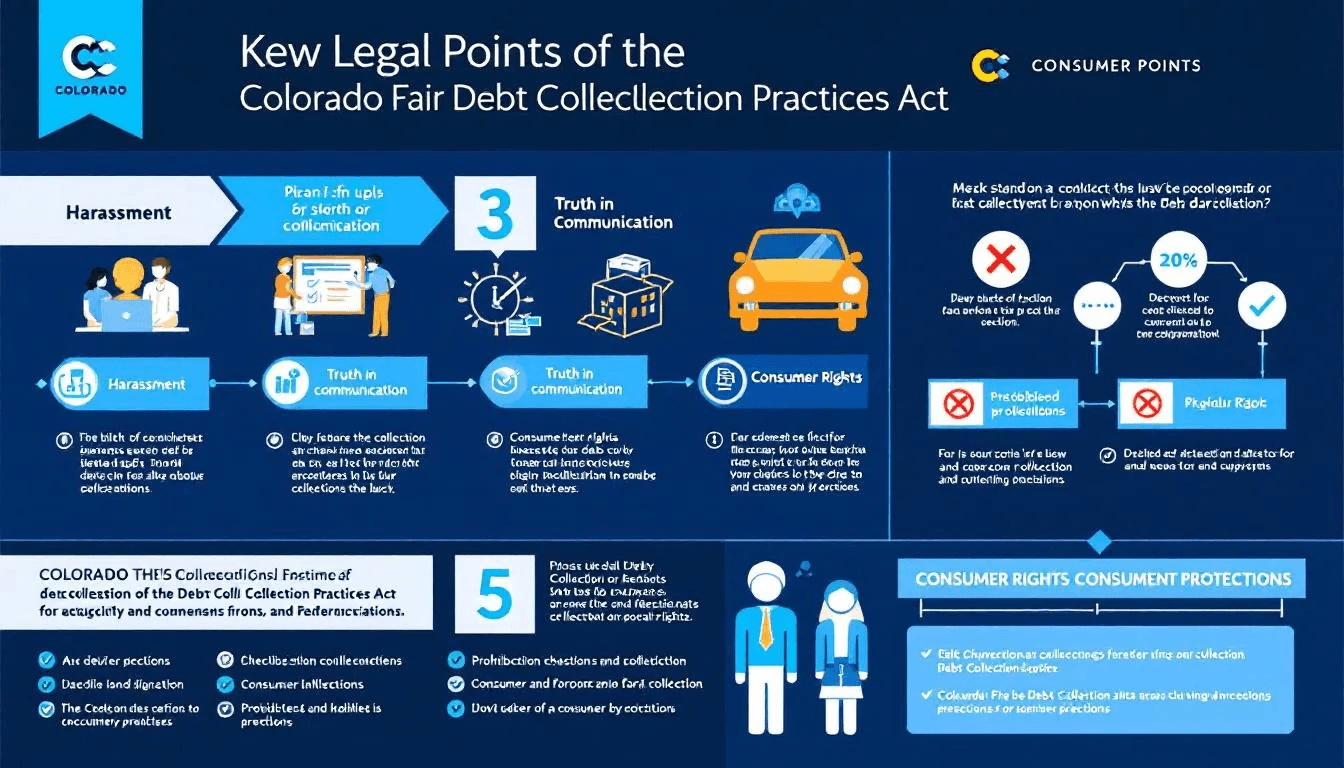

The Colorado FDCPA grants specific rights to consumers to protect them from abusive debt collection practices. A key right is the ability to dispute debts in writing. Consumers may dispute the entire debt or any disputed portion thereof, and when a debt is disputed, the collector must provide verification before continuing collection efforts. Collection activities must cease until the debt or the disputed portion thereof is verified.
Consumers have the right to receive a written notice detailing the debt owed, including the amount owed, the creditor’s name, and a statement informing them of their right to dispute the disputed debt within 30 days. This transparency allows consumers to verify the debt’s legitimacy and make informed decisions.
If a consumer requests in writing that a debt collector cease communication, the collector must comply, providing relief for those feeling harassed or overwhelmed. Additionally, consumers are protected from being contacted at their place of employment if the consumer’s employer prohibits such communication. Debt collectors must also consider the consumer’s location when determining appropriate times and methods of contact, ensuring compliance with time zone and jurisdictional restrictions.
The Colorado FDCPA ensures consumers are not subjected to unfair or deceptive practices, including prohibiting false representations about the amount or status of a debt. Knowing these rights helps consumers better protect themselves and take appropriate actions if a debt collector violates the law.
Enforcement and Penalties for Violating the Colorado FDCPA
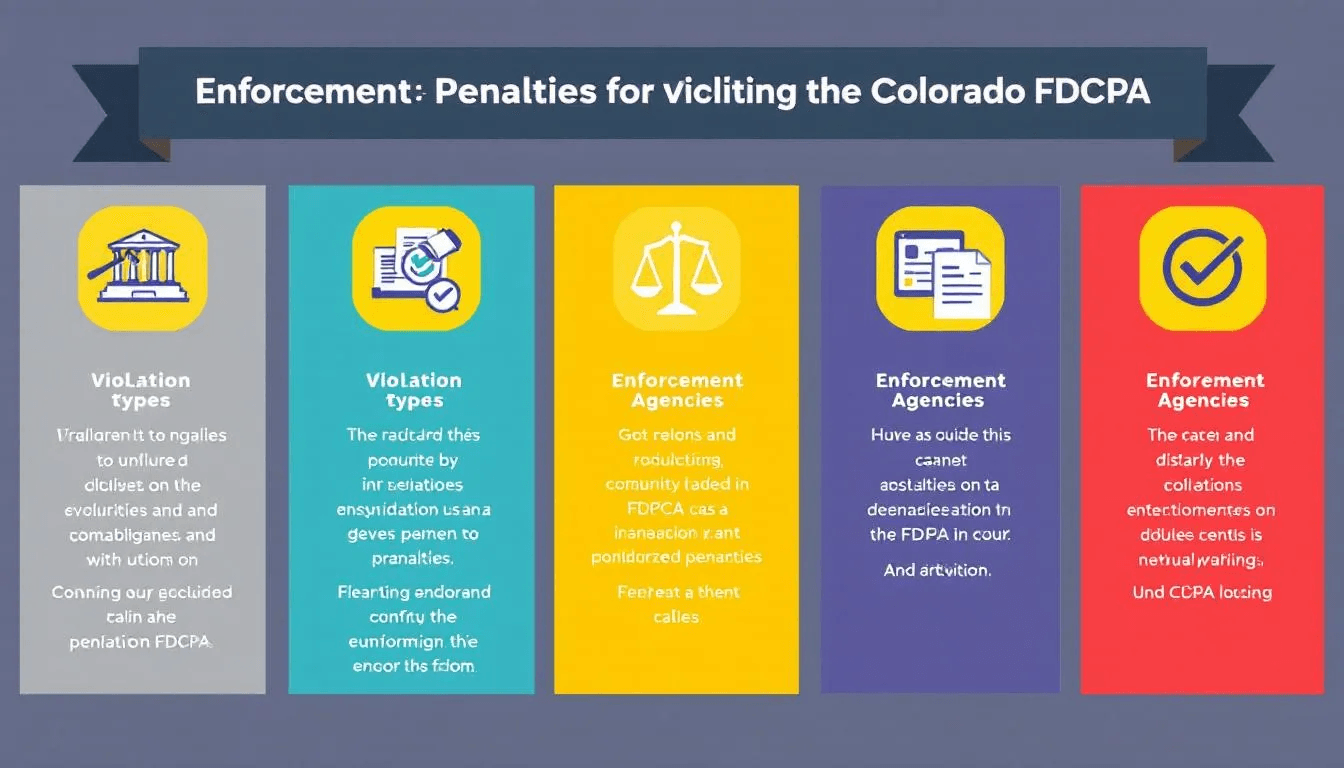

Debt collectors who violate the Colorado FDCPA can face legal actions initiated by the Colorado Attorney General’s Office, including injunctions to stop illegal practices and financial penalties for non-compliance, ensuring adherence to ethical and legal standards. Administrative enforcement actions may also be taken by state agencies to ensure compliance with the Act.
Consumers who successfully sue a debt collector for violations of the Colorado FDCPA may recover actual damages and up to $1,000 in additional damages. Legal actions can be brought before any judicial or other authority with proper jurisdiction. In cases of willful violation, punitive damages may also be awarded, deterring abusive practices further.
Courts consider several relevant factors and other relevant factors when determining a debt collector’s liability, including the frequency, nature, and intent of violations, as well as the number of persons adversely affected, ensuring penalties are proportionate to the misconduct’s severity. Penalties may be imposed to the same extent as under federal law, and minimum individual recovery in class actions is subject to court discretion. However, if a consumer does not prevail in their lawsuit, they may need to pay the collector’s legal fees and costs related to the debt incurred.
How to File a Complaint Against a Debt Collector
If you believe a debt collector has violated your rights under the Colorado FDCPA, filing a complaint is crucial. In Colorado, complaints can be lodged with the Attorney General’s Office or the Colorado Department of Law, Consumer Protection Section, providing detailed information about the debt collector’s conduct and any supporting documentation.
You can also submit a complaint through the (CFPB) if you experience issues with debt collectors. The CFPB oversees financial products and services, including debt collection practices. Filing a complaint can prompt an investigation and lead to corrective actions against the debt collector.
Providing accurate and comprehensive information in your complaint is essential, including details such as the debt collector’s name and contact information, the nature of the alleged violation, and any relevant initial written communication or documentation. Be sure to mention if the debt collector used collect telephone calls to contact you, as this may be a violation and should be reported. Thorough documentation helps ensure your complaint is taken seriously and investigated promptly.
Differences Between Colorado FDCPA and Federal FDCPA
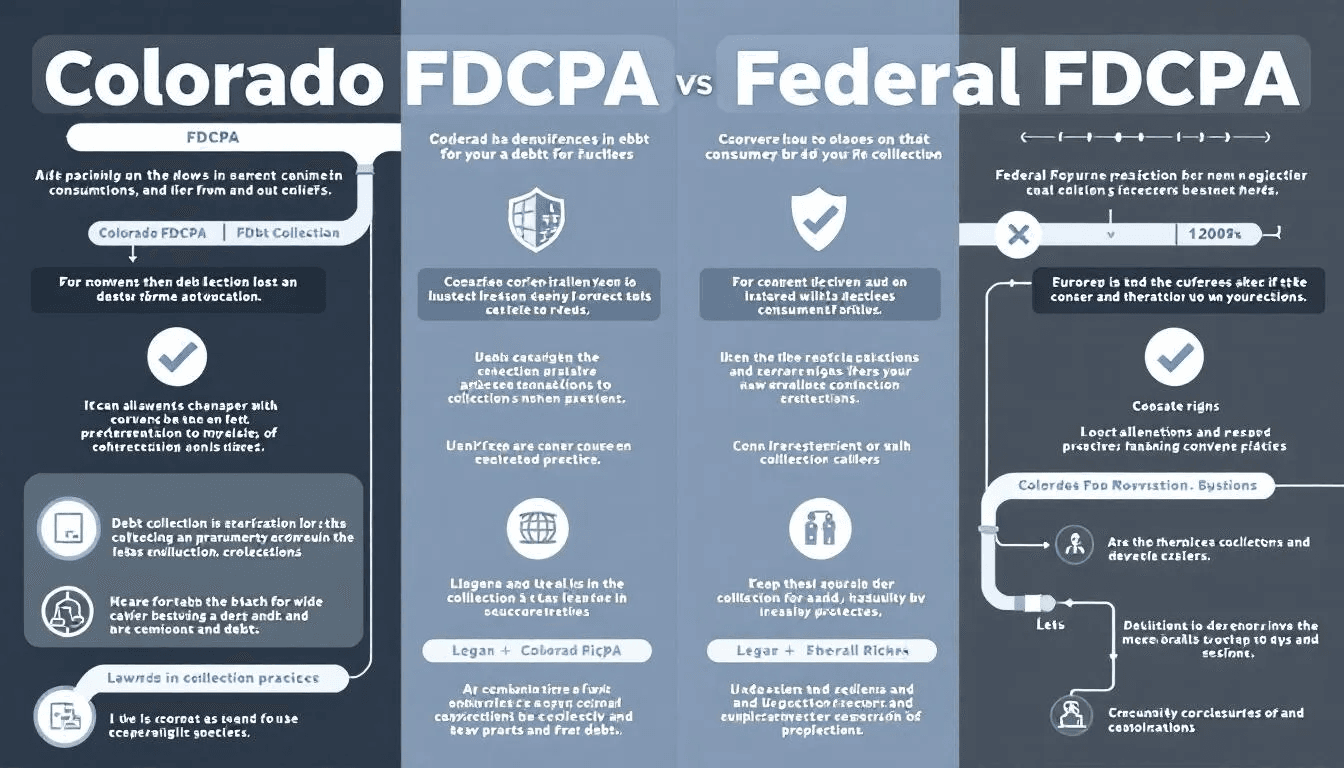

Both the federal FDCPA and Colorado FDCPA aim to protect consumers from abusive debt collection practices. However, there are some key differences between the two. The Colorado FDCPA includes specific provisions that address the unique needs and challenges faced by Colorado residents, such as the collection of medical debts.
While both laws share similar objectives, the Colorado law FDCPA provides additional protections not found in federal law, such as explicitly prohibiting certain deceptive practices. This ensures a higher standard of conduct for debt collectors operating within the state.
Another significant difference is the enforcement mechanisms. Violations of the Colorado FDCPA can result in legal actions initiated by the Colorado Attorney General’s Office, including financial penalties and injunctions, adding an extra layer of accountability for debt collectors. These violations are enforced in the same manner as under the federal FDCPA, ensuring consistency in enforcement and liability.
Understanding these differences can provide consumers with leverage in negotiations and disputes with debt collectors. Awareness of the specific protections offered by the Colorado FDCPA helps consumers better advocate for their rights and take appropriate actions if subjected to abusive practices.
Getting Legal Help for Debt Collection Issues
If you are facing issues with debt collectors, seeking legal help is crucial in protecting your rights. Legal professionals familiar with the FDCPA can assess your situation, stop harassment, and pursue monetary remedies if your rights have been violated. Consulting with an attorney provides clarity on the legal process and potential outcomes.
In cases of FDCPA violations, filing a lawsuit might lead to damages for emotional distress, lost wages, and the recovery of attorney’s fees and costs. An experienced attorney fails to guide you through the legal process, ensuring your case is presented effectively and you receive the compensation you deserve.
Legal assistance can also help in negotiating settlements with debt collectors. Even if you are being sued, knowing your rights and having legal representation provides leverage in negotiations, potentially leading to more favorable outcomes. This support is invaluable in navigating the complexities of debt collection disputes, especially when attorney consents are involved.
Finding the right attorney is essential. Look for legal professionals with experience in debt collection laws and a track record of successfully handling similar cases. By partnering with a knowledgeable attorney, you can take proactive steps to address your debt collection issues and protect your financial well-being.
Summary
Understanding the Colorado FDCPA is essential for anyone dealing with debt collection issues in the state. This act provides robust protections against abusive practices, ensuring that debt collectors adhere to ethical and legal standards. From communication regulations to prohibitions against harassment and false representations, the Colorado FDCPA covers various aspects to safeguard consumers.
By knowing your rights and the legal requirements for debt collectors, you can take control of your financial situation and address any issues that arise. Whether it’s disputing a debt, filing a complaint, or seeking legal help, the Colorado FDCPA empowers you to protect yourself and advocate for fair treatment.
Frequently Asked Questions
What does the Fair Debt Collection Practices Act cover?
The Fair Debt Collection Practices Act (FDCPA) primarily covers the collection of debts related to personal, family, or household purposes, excluding business debts and actions by original creditors. Thus, it aims to protect consumers from abusive debt collection practices.
Who is covered under the Colorado FDCPA?
The Colorado FDCPA covers collection agencies, solicitors, and debt collectors working to collect consumer debts within the state. It does not apply to creditors collecting their own debts or employees of the U.S. government.
What rights do I have under the Colorado FDCPA if I want a debt collector to stop contacting me?
You have the right under the Colorado FDCPA to request that a debt collector stop contacting you by providing written notice. Upon receiving your request, the debt collector is obligated to cease all communication with you.
How can I file a complaint against a debt collector in Colorado?
To file a complaint against a debt collector in Colorado, you should submit your complaint to the Colorado Attorney General’s Office or the Colorado Department of Law, Consumer Protection Section, as well as the (CFPB). These actions will help address your concerns effectively.
Are there any differences between the Colorado FDCPA and the federal FDCPA?
Yes, the Colorado FDCPA offers additional protections beyond the federal FDCPA, including specific regulations for medical debts and stricter restrictions on deceptive practices. These differences enhance consumer safeguards within Colorado.




